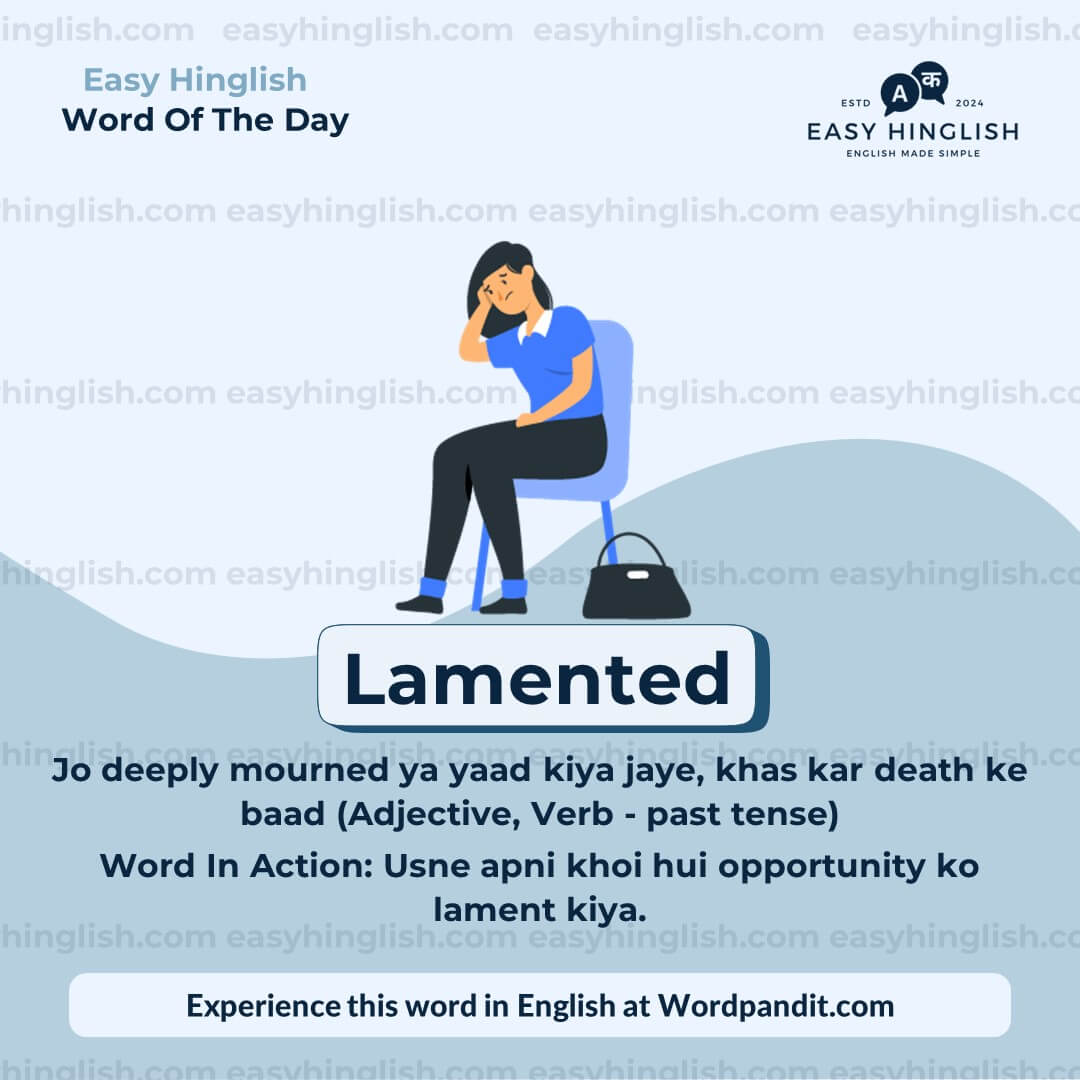Daily Vocabulary International Newspapers aur Publications se Seekho
Wordpandit ke Global Vocabulary Hub ke Saath Apni Vocabulary Expand Karo
Wordpandit par, hum aapko ek truly global vocabulary develop karne me madad karte hain, jo duniya ke sabse respected international publications se li gayi hoti hai. Yeh section aapko naye words se introduce karne ke liye design kiya gaya hai jo global conversations aur trends ko define karte hain.
Global Sources ka Power
Aapko globally sochne aur communicate karne me madad dene ke liye, hum vocabulary curate karte hain world ke top international sources se, jaise:
- The New York Times
- The Washington Post
- BBC
- The Guardian
- The Economist
- Scientific American
- Psychology Today
- Aur bhi bahut saare...
Globally Socho, Competitively Seekho
Hamare daily updates se aap international publications ke naye words seekhoge jo global news aur developments se jude hote hain. Isse aapki vocabulary current bhi rahegi aur globally relevant bhi.
Apni Global Soch Ko Expand Karo
Agar aap international exams ki tayari kar rahe ho, global business communication me excel karna chahte ho, ya sirf apni language skills improve karna chahte ho, toh Wordpandit aapko global level pe grow karne ke liye best resources provide karta hai.
Smart Learning, Global Reach
Hamari learning methodology me global examples, memory aids, aur interactive activities shamil hain, jo naye words ko effectively yaad karne aur real-world me use karne me madad karti hain.
Aaj Hi Apni Global Vocabulary Journey Shuru Karo!
Wordpandit Kyun Choose Karein?
Practical Learning: Aise words seekho jo real-world reading aur communication me aapko sach me kaam aayenge, taaki aapki comprehension aur bolne ki skills improve ho.
Diverse Content: Current affairs se lekar scientific breakthroughs tak, hamare different sources aapko multiple domains ki vocabulary seekhne ka moka dete hain.
Effortless Integration: Wordpandit ko apni daily routine ka part banao. Sirf kuch minute har din dene se aapki vocabulary time ke saath kaafi improve ho sakti hai.
Vocabulary Mastery Tak Ka Aapka Safar
- Regularly hamare Daily Vocabulary section ko visit karo
- Naye words explore karo aur unka context me use samjho
- In words ko apni writing aur bolne ki practice me use karne ki koshish karo
- Jaise-jaise aapke words badhte hain, apni progress ko track karo
Aaj Hi Apni Vocabulary Journey Shuru Karo!
Wordpandit ke saath vocabulary improve karna start karo. Roz thoda effort dalne se aap ek strong vocabulary develop kar sakte ho jo academic, professional, aur personal life me kaafi kaam aayegi.
Yaad rakho, ek naya shabd roz seekhna linguistic limitations ko door karne ka best tareeka hai! Wordpandit ko apni daily learning journey ka sathi banao aur vocabulary excellence ki taraf badho!
WORD-1: Rewarding
Sandarbh (Context):
"And he told of brilliant scientific minds who might know a lot about the second law but were barely up to the task of reading Charles Dickens, let alone an 'esoteric, tangled and dubiously rewarding writer...like Rainer Maria Rilke.'" - Aeon
Vyakhya (Explanatory Paragraph):
"Rewarding" ek aisa shabd hai jo kisi aise experience ya kaam ko describe karta hai jo mehnat ke baad khushi, fayda ya satisfaction deta hai. Lekin upar wale context mein iska use thoda negative hai — jaise kehna ki Rainer Maria Rilke ka likha padhna itna mushkil hai ki shayad uska emotional ya intellectual return worth na ho. Yani effort zyada aur reward doubtful.
Arth (Meaning): Mehnat ke baad khushi ya fayda dene wala (Adjective)
Uccharan (Pronunciation): ruh-WAWR-ding
Kathinai Star (Difficulty Level): ⭐⭐ Beginner
Utpatti (Etymology): "Reward" se bana hai, jo aaya hai Old North French *rewarder* se — jiska matlab hota tha "regard, consider, reward".
Prashant Sir Ke Tathya (Prashant Sir's Notes):
Yeh word un experiences ya kaam ke liye kaafi useful hai jo emotionally, intellectually ya financially fayda dete hain. Lekin jaise iss context mein, kabhi kabhi iska use sarcastic tareeke se bhi hota hai — jab fayda doubtful ho.
Samanarthi & Vipritarthi (Synonyms & Antonyms):
Samanarthi (Synonyms): fulfilling, satisfying, enriching, beneficial, gratifying
Vipritarthi (Antonyms): frustrating, disappointing, unfulfilling, fruitless, unproductive
Udaharan (Usage Examples):
- Animal shelter mein volunteering karna mere liye ek bahut rewarding experience raha.
- Project mushkil tha, lekin end mein bahut rewarding sabit hua.
Sanskritik Sandarbh (Cultural Reference):
"Gyaan ki talaash, chahe kitni bhi mushkil ho, insani jeevan ke sabse rewarding safaron mein se ek hai." - Inspired by Carl Sagan
Sochiye (Think About It):
Kya koi cheez tab bhi rewarding keh sakte hain jab usse turant khushi ya success na mile?
Chhoti Kriya (Quick Activity):
3 aise kaam likhiye jo aapko personally rewarding lagte hain, aur batayein kyun. Saath hi ek aisa bhi likhiye jo aapko rewarding lagta tha, lekin hua nahi.
Yaad Karne Ka Tarika (Memory Tip):
"Rewarding" yaad rakhne ke liye sochiye: jab aap mehnat karte ho aur uska "reward" milta hai — wahi hota hai rewarding!
Vastavik Jeevan Me Upyog (Real-World Application):
Interviews ya resumes mein "rewarding" word kaafi use hota hai: “Mera project manage karna ek incredibly rewarding experience tha.” Yeh word aapke positive attitude aur growth dikhata hai.
WORD-2: Diatribe
Context:
"Sixty-plus years after Snow's diatribe, the rift has hardly narrowed." - Aeon
Explanatory Paragraph:
The word "diatribe" refers to a forceful and bitter verbal or written attack against someone or something. In the sentence above, it refers to Snow's critical speech or writing—likely targeting a group or an idea—that left a lasting impact, as the division or "rift" it addressed still exists decades later. A diatribe is not a calm critique; it's often emotional, impassioned, and harsh in tone.
Meaning: A bitter, sharply abusive denunciation, criticism, or attack (Noun)
Pronunciation: DYE-uh-tribe
Difficulty Level: ⭐⭐⭐ Intermediate
Etymology: From Greek *diatribē* meaning "discourse, debate", which evolved through Latin and French to imply a long, critical speech or piece of writing.
Prashant Sir's Notes:
Think of a diatribe as more than just criticism—it's like a verbal assault. Often used in political or intellectual settings to express deep frustration or outrage. This is a high-intensity word, so use it sparingly and wisely.
Synonyms & Antonyms:
Synonyms: tirade, rant, harangue, condemnation, broadside
Antonyms: praise, commendation, eulogy, tribute, compliment
Usage Examples:
- The politician launched into a diatribe against the media during the press conference.
- Her blog post was less of a review and more of a diatribe targeting the film industry.
- The professor's lecture turned into a diatribe about the failures of modern education.
- They sat in silence as his diatribe against social media continued unchecked.
Cultural Reference:
"Hunter S. Thompson was famous for his gonzo journalism, often blending factual reporting with satirical diatribes against American politics and culture." - Literary Analysis
Think About It:
Can a diatribe ever be productive, or does its aggressive tone undermine its message?
Quick Activity:
Write two short sentences: one expressing calm disagreement and one as a diatribe. Notice the difference in tone and impact.
Memory Tip:
Think of "diatribe" as a “tribe” of angry words "dying" to get out — a passionate verbal attack.
Real-World Application:
You'll often encounter "diatribe" in editorials, political commentary, or social media debates. It’s useful when describing speech or writing that goes beyond criticism into outrage or harsh attack.
WORD-3: Lamented
Sandarbh (Context):
“The Duchess is remembered as one of the great beauties of Ireland and is deeply lamented to this day.” - Aeon
Vyakhya (Explanatory Paragraph):
"Lamented" ka matlab hota hai kisi ke guzar jaane ke baad uske liye gahri udaasi ya dukh mehsoos karna. Upar wale sentence mein, yeh bataya gaya hai ki Duchess sirf khoobsurat nahi thi, balki aaj bhi log unki yaadon ko respect aur dukh ke saath yaad karte hain. Jab koi apne achhe kaamon, personality ya legacy ke wajah se yaad kiya jata hai, toh "lamented" ka use hota hai.
Arth (Meaning): Kisi ke guzarne ke baad uska shok manana ya dukh mehsoos karna (Adjective; verb ka past form bhi hai)
Uccharan (Pronunciation): luh-MEN-tid
Kathinai Star (Difficulty Level): ⭐⭐ Beginner
Utpatti (Etymology): Latin *lamentari* se nikla hai, jiska matlab tha "rona ya shok vyakt karna", aur Old French *lamenter* ke zariye English mein aaya.
Prashant Sir Ke Tathya (Prashant Sir's Notes):
“Lamented” ka istemal un logon ke liye hota hai jo marne ke baad bhi logon ke dilon mein zinda hote hain. Yeh shabd formal ya poetic contexts mein zyada aata hai. Dhyan rahe: isse sirf death ke context mein use karte hain — disappointment ke liye nahi.
Samanarthi & Vipritarthi (Synonyms & Antonyms):
Samanarthi (Synonyms): mourned, grieved, sorrowed, bewailed, wept for
Vipritarthi (Antonyms): celebrated (in different context), ignored, forgotten, overlooked
Udaharan (Usage Examples):
- Woh professor aaj bhi apne students ke beech deeply lamented hain.
- Jab uska purana ghar giraya gaya, to usne us loss ko bahut lament kiya.
Sanskritik Sandarbh (Cultural Reference):
"Shakespeare ke plays mein, characters aksar apno ke marne par poetic style mein lament karte hain — unke dukh ko gehraai se vyakt karte hue." - Literary Studies
Sochiye (Think About It):
Kya kisi vyakti ke liye “truly lamented” kehna tabhi possible hai jab usne jeevan mein kuch impactful kiya ho?
Chhoti Kriya (Quick Activity):
Kisi vyakti (real ya fictional) ke liye chhota sa tribute likhiye jisme “lamented” ka use ho, aur batayein unki yaad kyun dil se aati hai.
Yaad Karne Ka Tarika (Memory Tip):
"Lamented" yaad rakhne ke liye sochiye — "lament + end" — jab kisi ki life end hoti hai aur uska shok manaya jata hai.
Vastavik Jeevan Me Upyog (Real-World Application):
“Lamented” aksar obituaries, historical articles ya tributes mein use hota hai — jab hum kisi vyakti ke guzar jaane ke baad uske impact aur yaadon ko respectfully yaad karte hain.
WORD-4: Eminent
Sandarbh (Context):
"And he quoted eminent colleagues such as the Nobel laureate Steven Weinberg, Stephen Hawking and Neil deGrasse Tyson, who agreed that 'philosophy is dead'..." - Aeon
Vyakhya (Explanatory Paragraph):
"Eminent" un logon ke liye use hota hai jo kisi specific field mein highly respected aur prakhyat hote hain. Jaise upar ke context mein, yeh word un scientists ke liye use hua hai jinke naam ke saath unki expertise aur achievements automatically yaad aati hain. Yeh sirf popularity nahi, balki true professional excellence ko dikhata hai.
Arth (Meaning): Kisi field mein mashhoor aur sammanit vyakti (Adjective)
Uccharan (Pronunciation): EM-uh-nuhnt
Kathinai Star (Difficulty Level): ⭐⭐ Beginner
Utpatti (Etymology): Latin *eminentem* se aaya hai, jiska matlab tha "jo alag dikhta ho ya ucha ho", derived from *eminere* — "to stand out".
Prashant Sir Ke Tathya (Prashant Sir's Notes):
Yeh ek respectful aur admiration bhara word hai. Aap ise use kar sakte hain eminent scientist, author, thinker, ya judge ke liye. Iska matlab hota hai ki woh vyakti apne field mein leader hai — sirf famous nahi, impactful bhi.
Samanarthi & Vipritarthi (Synonyms & Antonyms):
Samanarthi (Synonyms): distinguished, renowned, respected, notable, prestigious
Vipritarthi (Antonyms): unknown, obscure, insignificant, unremarkable, ordinary
Udaharan (Usage Examples):
- Usne Harvard ke ek eminent neuroscience professor ke under study kiya tha.
- Yeh award ek eminent healthcare leader ko diya gaya.
Sanskritik Sandarbh (Cultural Reference):
"Eminent physicist Richard Feynman na sirf Nobel Prize winner the, balki ek zabardast teacher bhi the, jo science ko simple aur exciting bana dete the." - Scientific American
Sochiye (Think About It):
Kya kisi ko eminent banata hai — unka fame, unka impact, ya unki integrity?
Chhoti Kriya (Quick Activity):
Teen alag fields (science, arts, politics) se teen eminent logon ke naam likhiye. Unka kya contribution tha jo unhe eminent banata hai?
Yaad Karne Ka Tarika (Memory Tip):
“Eminent” ko yaad karne ke liye sochiye: "eminent = prominent" — yani jo sabse alag dikhe aur sabse upar ho apne field mein.
Vastavik Jeevan Me Upyog (Real-World Application):
“Eminent” journalism, academic writing aur formal bios mein common hai. Jaise: “Dr. Rao, an eminent cardiologist, spoke at the summit.” Yeh word authority aur respect show karta hai.
WORD-5: Laureate
Sandarbh (Context):
"And he quoted eminent colleagues such as the Nobel laureate Steven Weinberg, Stephen Hawking and Neil deGrasse Tyson..." - Aeon
Vyakhya (Explanatory Paragraph):
"Laureate" un vyaktiyon ke liye use hota hai jinhone kisi specific field mein outstanding achievement ke liye bada award jeeta ho. Jaise is sentence mein, “Nobel laureate” ka matlab hai Steven Weinberg ko unke scientific contribution ke liye Nobel Prize mila. Yeh word excellence ke saath official recognition ko bhi dikhata hai — chaahe wo literature ho, science ho ya peace efforts.
Arth (Meaning): Koi vyakti jo kisi field mein outstanding kaam ke liye sammanit hua ho (Noun)
Uccharan (Pronunciation): LOR-ee-uht
Kathinai Star (Difficulty Level): ⭐⭐ Beginner
Utpatti (Etymology): Latin *laureatus* se aaya hai, jiska matlab hota hai “laurel se saja hua” — jaise ki purane Rome mein vijetaon ke sir par laurel crown rakha jata tha.
Prashant Sir Ke Tathya (Prashant Sir's Notes):
"Laureate" aksar formal settings mein use hota hai, jaise Nobel Laureate ya Poet Laureate. Yeh word tabhi use karo jab kisi ko ek bade level ka award mila ho. Dhyan rahe, yeh word tabhi complete hota hai jab aap uske saath uska field ya award bhi mention karein.
Samanarthi & Vipritarthi (Synonyms & Antonyms):
Samanarthi (Synonyms): award-winner, honoree, prizewinner, recipient
Vipritarthi (Antonyms): unknown, unrecognized, amateur, novice
Udaharan (Usage Examples):
- Malala Yousafzai sirf 17 saal ki umar mein sabse chhoti Nobel laureate bani thi.
- Poet Laureate ko national holiday ke liye kavita likhne ko kaha gaya.
Sanskritik Sandarbh (Cultural Reference):
"Bob Dylan ko Nobel Prize in Literature diya gaya, jisse wo ek controversial par yaadgar laureate ban gaye — unke poetic lyrics aur music ke fusion ke liye." - BBC Culture
Sochiye (Think About It):
Kya ek laureate ko apni recognition ka use social ya political change ke liye karna chahiye, ya sirf apne field tak seemit rehna chahiye?
Chhoti Kriya (Quick Activity):
Kisi ek Nobel laureate ka naam likhiye aur ek sentence mein unka contribution summarize kariye — kyun unhe award mila?
Yaad Karne Ka Tarika (Memory Tip):
"Laureate" yaad rakhne ke liye sochiye "laurel crown" — jaise purane zamaane mein vijeta ke sir par daala jaata tha. Yani laureate = jise samman ka crown mila ho.
Vastavik Jeevan Me Upyog (Real-World Application):
"Laureate" shabd academic, scientific aur literary fields mein use hota hai jab kisi vyakti ko unke kaam ke liye top-level awards milte hain — jaise Nobel Laureate ya Poet Laureate.













